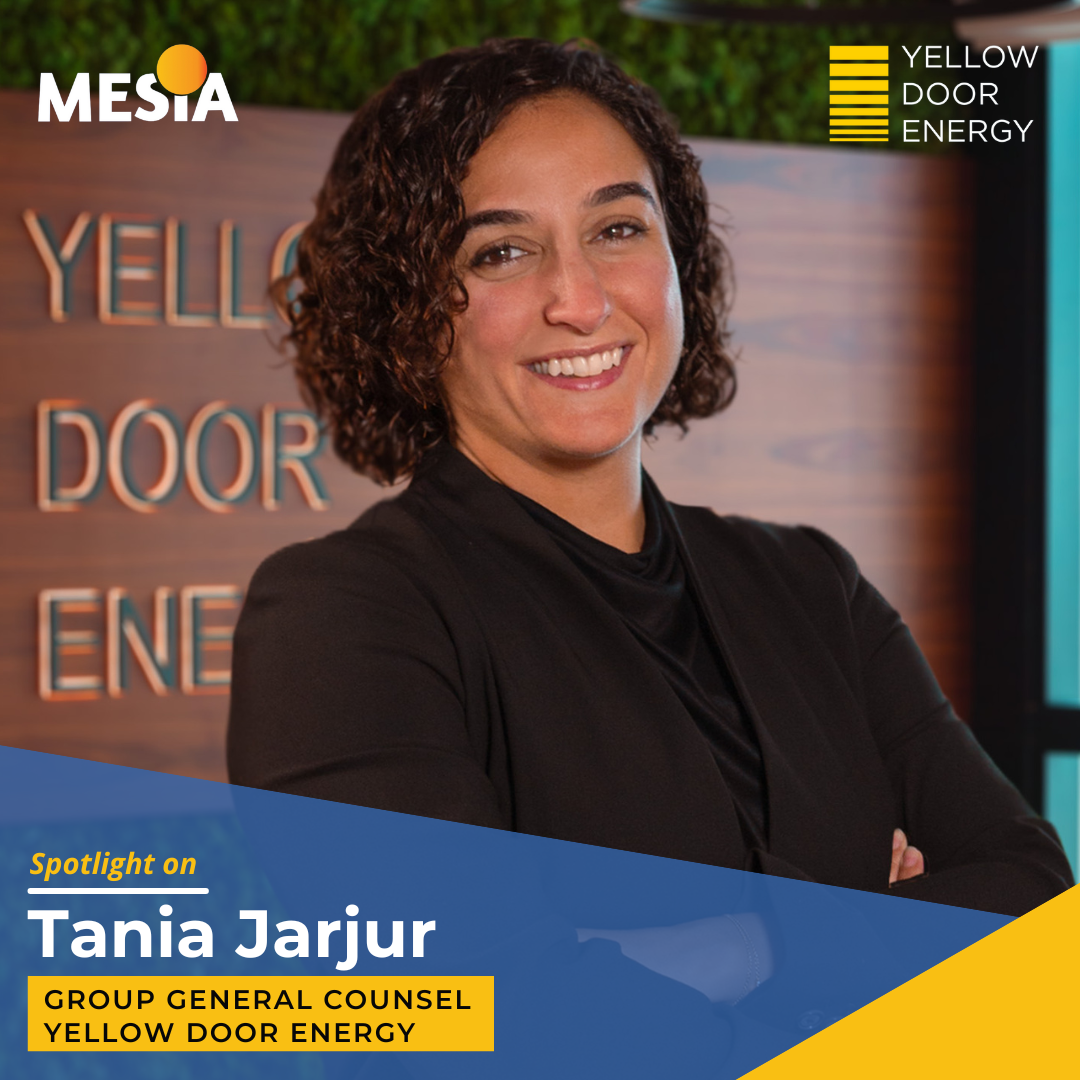Spotlight on Tania Jarjur, Group General Counsel - Yellow Door Energy

Please introduce yourself and your role at Yellow Door Energy.
I’m Tania Jarjur, Group General Counsel at Yellow Door Energy. As the head of the legal department, I am responsible for, and oversee, multiple legal verticals. This includes projects (contracts related to customers, EPC, procurement), M&A, entering new markets, project finance, litigation and dispute management as well as reporting to the Board and Shareholders. I also ensure the company complies with all the relevant regulations, such as anti-bribery and anti-money laundering, whistleblowing, and enhanced third-party due diligence work to ensure that the counterparties we work with don’t violate our policies.
As Group General Counsel, what is the role of legal professionals in the solar industry? Do you foresee evolution of solar contracts and how so?
Our industry is highly regulation-dependent, so it is important to have a very clear understanding of different regulations and how they apply to our business model. While each country has its own take on how the private sector can adopt renewable energy, there is some overlap of principles of net metering, net billing and/or wheeling.
Legal professionals, whether in private practice, in-house or in government, are at the forefront of the Just Transition. External law firms bring broad industry knowledge and can help lead advocacy and regulatory changes with governments. In-house counsels and government legal departments use their deep knowledge of the business and industry to implement and push for change.
It has been great to see the evolution of solar contracts in this region over the years. Corporate power purchase agreements have increased by 2.3 times in the past 5 years to reach 46 gigawatts. This is exciting for a solar developer such as Yellow Door Energy, because we provide power purchase agreements (PPA’s) for corporations. We’re also seeing more awareness and acceptance of this “leasing” business model, whereby corporations lease to own solar power plants without incurring their own capital expense. Instead, they save money and pay a monthly electricity bill for renewable electricity generated on their premises, or through solar wheeling.
You were named MESIA’s Woman in Solar of the Year in 2022. How can we have more women in the industry?
First and foremost, thank you for this award. I am truly humbled and honored by the recognition. I look forward to seeing more women have the opportunity to excel in C-suite and leadership positions within our industry.
I do see more women in leadership roles joining this sector each year, and I hope that as a community, we continue to encourage more women to participate. It is important to show that thriving in this sector does not necessarily require you to be a solar engineer – these roles can be anything from accounting, to legal, to commercial as well as finance and investments. Recognizing that expansion of roles will definitely bring more women into the industry.
What advice would you give to new lawyers on ways to achieve success in their careers?
I think it is important to understand that success has many definitions, and there are a multitude of ways to get there, not just one (or the traditional one). Pick an industry you feel passionate about and focus on jobs in that sector. A legal background allows you to wear many different hats, so it’s okay to take a risk and be a bit creative with your role. With the progress of technology and AI, I anticipate that pure, by-the-book legal analysis will eventually be automated. To stay relevant, you need to be able to take a commercial view on that analysis and integrate it into value added strategy for the company or sector. Mixing legal with commercial or technical skills will take you much further in your career.
Lastly, what are some recent innovations in solar energy that will be gamechangers?
Artificial Intelligence (AI) has been the darling of the media world recently. We use AI in certain parts of our operations, such as in predictive operations & maintenance (O&M), where we have a central monitoring system that gathers data points from all our projects to fuel the AI algorithm. Through this, we can quickly adjust the cleaning schedules of our solar plants in an intelligent manner. AI is also used by various departments to enhance overall efficiency of recurring processes, including the legal department. Incorporating AI into our review of contracts is transforming the way and speed at which we review contracts and establish our risk matrices.
As mentioned above, less “exciting” but extremely impactful is the fact that corporate power purchase agreements have increased by 2.3 times in the past 5 years to reach 46 gigawatts. The private sector has a significant role to play in the race to Net Zero, and it is encouraging to see that over 1,000 companies now have Net Zero targets, representing a staggering 40% increase in the past 16 months alone. This trend makes me very optimistic about the future of solar and renewable energy overall!
Sources:
https://about.bnef.com/blog/corporate-clean-power-buying-grew-12-to-new-record-in-2023-according-to-bloombergnef/
https://zerotracker.net/analysis/new-analysis-half-of-worlds-largest-companies-are-committed-to-net-zero
About Yellow Door Energy:
Yellow Door Energy is the leading sustainable energy partner for businesses, serving commercial and industrial customers in the Middle East, Africa and beyond. The company’s solar and battery energy storage system (BESS) solutions enable businesses to reduce energy costs, improve power reliability and lower carbon emissions. These solutions directly contribute to companies’ and countries’ Net Zero targets. Yellow Door Energy’s shareholders are Actis, the International Finance Corporation (IFC), Mitsui & Co., Ltd., and The Arab Energy Fund (formerly APICORP). www.yellowdoorenergy.com
